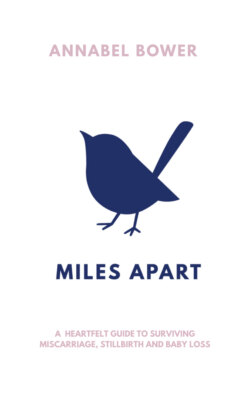Читать книгу Miles Apart - Annabel Bower - Страница 1
На сайте Литреса книга снята с продажи.
A note about terminology
ОглавлениеI have thought long and hard about how to refer to babies who die in utero. I have found it hard to say the words; my baby died. But despite how harsh it sounds, that’s the reality of the situation: my baby died.
I think people who have not experienced the death of a baby in utero first-hand, also struggle with saying this. The concept of a baby dying before it has been born or taken its first breath can be hard to rationalise. If you carried the baby, however, it is painfully clear that your baby was alive inside you until their heart stopped beating.
The most common way we refer to babies who die in utero is as ‘lost babies’. Baby loss is often used as the overarching title for this topic and encompasses the death of a baby at any stage of pregnancy and in infancy. Other terms used are ‘angel baby’, ‘lost pregnancy’, ‘interrupted pregnancy’, ‘born sleeping’, ‘miscarried fetus’, ‘unviable embryo’, ‘retained products of conception’, ‘genetic termination’, ‘termination for medical reasons’ and ‘born still’. Ultimately, they all mean the same thing: a baby who has passed away before, or after birth, and heartbroken parents with empty arms.
Those of us who have lived through this tragedy know, that we did not lose our babies, or simply forget to bring them home from hospital with us, they died. For me, the term I found myself saying the most was ‘we lost our baby’, especially in the early stages of grief. It took me a long time to say the words, ‘Miles died’. I also consider the many parents who have also walked this path to be part of the ‘baby loss community’, so I decided to use the terms ‘lost baby’ and ‘baby loss’ throughout the book.
Saying ‘lost babies’ or ‘baby loss’ is not an attempt to shy away from the distressing reality that my baby and so many others have died. It’s simply the description that flowed most freely as I was writing. I do also say, ‘when Miles died’ or ‘after Miles died’, as this accurately describes different points in time, and I encourage you to substitute whatever words feel most comfortable for you as you read through the pages ahead.
Annabel xx
